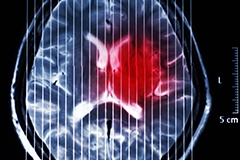Treating a Brain Tumor
Medically Reviewed by T. Rhett Spencer, Jr., MD
“There are multiple types of brain tumors, but 80 to 90 percent of what we treat are not true brain tumors,” says McLeod Radiation Oncologist Rhett Spencer, MD. “Most common is a tumor that has metastasized (spread) to the brain from another location in the body.”
The prognosis for patients with a metastasized brain tumor has changed considerably. We’ve seen changes in the treatment techniques for these tumors. You can manage their other systemic disease better with the new biologic modifiers or changes in chemotherapy. So, patients that are not technically cured may still live much longer with a very good quality of life.
On the other hand, we do see a large number of primary brain tumors, called gliomas. They can be a low-grade tumor that progresses very slowly and are usually managed with just surgery. If not treated, the tumor can progress to a glioblastoma, one of the most aggressive types. We treat and manage those tumors with a combination of surgery, radiation therapy, chemotherapy and, if serious enough, with a biologic modifier.
TARGETED RADIATION THERAPY
One of the newer brain tumor treatments is Stereotactic Radiosurgery. Although the term “surgery” is used, there is no actual cutting with a scalpel. Using multiple beams delivering high levels of radiation, a computer guides the radiation to a very targeted area, where the tumor is located.
Technically, fewer treatments are required – usually less than five. Sometimes, the tumor can be eradicated in just one treatment. Here’s why.
The SRS radiation unit moves in an arc as it treats. A very small area may receive radiation from 200 to 300 different angles. Picture the patient as the hub of a wheel. The radiation beams are the spokes of the wheel that come together at that hub. Then imagine the wheel is actually a ball with the beams coming from all angles. In traditional radiation treatments, the high radiation doses could destroy the normal tissue around the treated site. Yet, with SRS using computer calibrations and guidance, as you move just a few millimeters from the treated area, the dose falls off dramatically, sparing normal brain tissue.
TEAM APPROACH TO TREATMENT
We do know that treating a brain tumor truly requires a team approach. With a primary brain tumor, the glioblastoma, combining a certain form of chemotherapy with radiation brings superior results. The multi-disciplinary approach gives the best outcome results for the patient.
Some brain tumors are best treated by the neurosurgeon. We know that the best approach is to remove these tumors, some of which are non-cancerous (benign).
There are other tumors, which involve the brain itself. There is no clear, simple answer to what is the most appropriate treatment — surgery, radiation or chemotherapy? In those patients, a multi-disciplinary conference that includes radiation oncologists, medical oncologists, neurosurgeons, physicists (who help determine dosage of radiation) and nurses discuss the case and agree on a method of treatment.
Have a question? Ask a Cancer Specialist.
-
McLEOD REGIONAL MEDICAL CENTER FLORENCE
843-777-2000 -
McLEOD DARLINGTON
843-777-1100 -
McLEOD DILLON
843-774-4111 -
McLEOD LORIS
843-716-7000 -
McLEOD SEACOAST
843-390-8100 -
McLEOD CHERAW
843-537-7881 -
McLEOD CLARENDON
803-433-3000



-
McLEOD REGIONAL MEDICAL CENTER FLORENCE
843-777-2000 -
McLEOD DARLINGTON
843-777-1100 -
McLEOD DILLON
843-774-4111 -
McLEOD LORIS
843-716-7000 -
McLEOD SEACOAST
843-390-8100 -
McLEOD CHERAW
843-537-7881 -
McLEOD CLARENDON
803-433-3000
 Find a Doctor
Find a Doctor  Locations
Locations  Services
Services 